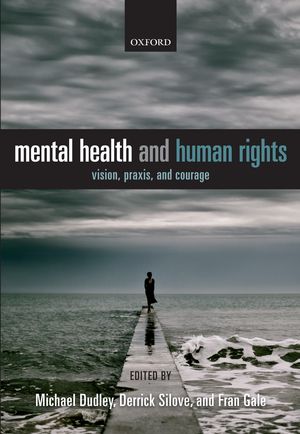
Mental disorders are ubiquitous, profoundly disabling and people suffering from them frequently endure the worst conditions of life. In recent decades both mental health and human rights have emerged as areas of practice, inquiry, national policy-making and shared international concern. Human-rights monitoring and reporting are core features of public administration in most countries, and human rights law has burgeoned. Mental health also enjoys a new dignity in scholarship, international discussions and programs, mass-media coverage and political debate. Today's experts insist that it impacts on every aspect of health and human well-being, and so becomes essential to achieving human rights. It is remarkable however that the struggle for human rights over the past two centuries largely bypassed the plight of those with mental disabilities.
Mental health is frequently absent from routine health and social policy-making and research, and from many global health initiatives, for example, the Millenium Development Goals. Yet the impact of mental disorder is profound, not least when combined with poverty, mass trauma and social disruption, as in many poorer countries. Stigma is widespread and mental disorders frequently go unnoticed and untreated. Even in settings where mental health has attracted attention and services have undergone reform, resources are typically scarce, inequitably distributed, and inefficiently deployed. Social inclusion of those with psychosocial disabilities languishes as a distant ideal. In practice, therefore, the international community still tends to prioritise human rights while largely ignoring mental health, which remains in the shadow of physical-health programs. Yet not only do persons with mental disorders suffer deprivations of human rights but violations of human rights are now recognized as a major cause of mental disorder - a pattern that indicates how inextricably linked are the two domains.
This volume offers the first attempt at a comprehensive survey of the key aspects of this interrelationship. It examines the crucial relationships and histories of mental health and human rights, and their interconnections with law, culture, ethnicity, class, economics, neuro-biology, and stigma. It investigates the responsibilities of states in securing the rights of those with mental disabilities, the predicaments of vulnerable groups, and the challenge of promoting and protecting mental health. In this wide-ranging analysis, many themes recur - for example, the enormous mental health burdens caused by war and social conflicts; the need to include mental-health interventions in humanitarian programs in a manner that does not undermine traditional healing and recovery processes of indigenous peoples; and the imperative to reduce gender-based violence and inequities. It particularly focuses on the first-person narratives of mental-health consumers, their families and carers, the collective voices that invite a major shift in vision and praxis. The book will be valuable for mental-health and helping professionals, lawyers, philosophers, human-rights workers and their organisations, the UN and other international agencies, social scientists, representatives of government, teachers, religious professionals, researchers, and policy-makers.